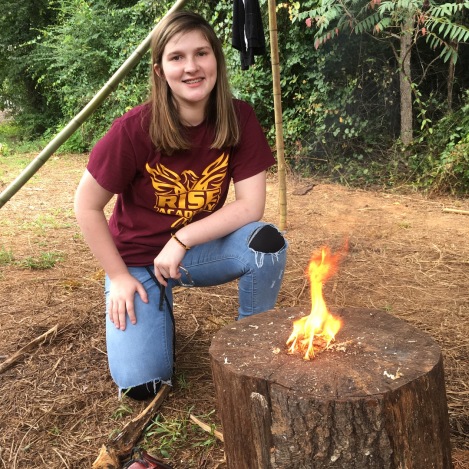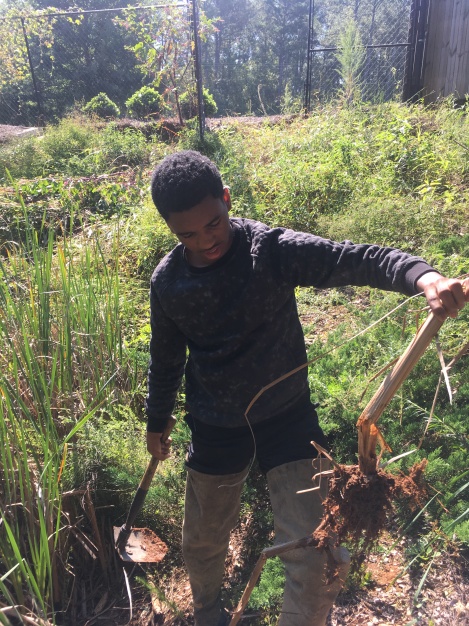by Todd Walker
“Earth and sky, woods and fields, lakes and rivers, the mountain and the sea, are excellent schoolmasters, and teach some of us more than we can ever learn from books.”
~ John Lubbock
Far from “wilderness”, an outdoor classroom sits atop an underground sewer line. When choices are slim to none, one takes what Nature provides. A concrete retaining wall manages storm-water from the school’s asphalt parking lot.
The black chain fence on top of the concrete wall, a legal requirement to keep kids out, is easily breached. Inside the “concrete pond,” a wetland ecosystem invites exploration. Cattails, a willow tree, and unidentified flora thrive in the “secondhand beaver pond,” less North America’s largest rodent. From the adjacent paved paradise, an uneducated eye would miss all the Nature possibilities.
At RISE Academy, our motto is “Second Chances ~ New Beginnings.” Our student’s have given the sewer line a second chance. The once weedy, vine infested location is now home to an outdoor classroom built by their own hands. In turn, their new beginnings are real and tangible. Math shifts from theoretical to the real-world as they determine angles, read a tape measure, and problem-solve structural design. Then there’s the reading, writing, science, and history to keep it all in context. Oh, and the physical skills of connecting bamboo securely. I’m happy to report that their construction stood up to Irma’s recent storms.
Our journey to self-reliance has begun on a pristine waste place beside a retention pond… our Nature. Even though our place may earn the top spot on the un-wilderness scale, the benefits of being out there are priceless. Interactive and authentic learning happens in our Nature. If nothing else, the lingering scent of woodsmoke in hair and clothing will hopefully remind them of the importance of surface-area-to-volume ratio and the science of fire.
Another benefit of being out there is becoming attached to the land. A mom told us that her son wants to bring a rake to clear vines and roots from his outdoor classroom. He recently commented on the bamboo structure, “I can’t believe we built this!”
Appreciation for our Nature doesn’t happen until we get kids outside to connect to all its gifts. Twigs, sticks, and rocks become personal. The tinder cattail shoots, once tasted, expands their notion of food and Nature being a grocery store. Dirt under their nails connect hands and hearts to their habitat.
Studies show promising results for connecting kids to nature.
- ADHD symptoms are reduced
- Critical thinking is increased
- Higher standardized test scores
- This study shows that four days of immersion in nature, and the corresponding disconnection from multi-media and technology, increases performance on a creativity, problem-solving task by a full 50%
- Get dirty to reduce anxiety and improve cognitive functioning
Our spot may not look like “virgin” wilderness, but it ours to curiously wander.
Designed for Doing
The things we have to learn before we do them, we learn by doing them.
~ Aristotle
The real world can’t be experienced on smart phones. Self-reliance is about doing the stuff, dirty hands, employing our senses, and discovering our potential. The first step is engineering an environment designed for doing.
All the math, science, history, reading, and writing typically shoveled into young brains is hardly ever retained. It’s a horrible strategy that keeps kids tied in knots of anxiety over test scores. Once they regurgitate facts floating in their head, the purge cycle begins to make room for the next test.
Here’s a thought…
Deep learning takes place by untying the tangled web of schooled knots. Instead of telling students what we, or the state, think they need to know, allow them to experience their interests.
But what about the curriculum and those dreaded high-stakes tests?
Remember we’re talking about deep learning not rote memorization of facts.
This little blog is an example of the importance of following one’s interest…
I never had an interest in writing. After my first 12 years of schooling, two college degrees, low C’s in every college English class, and over 500 blog posts, I still can’t dissect a sentence properly, not even if my life depended on it. I found that mastering parts of speech is not a prerequisite to writing. I’d bet my best double bit ax that most writers don’t think about this stuff either. They simply write.
Tim Smith’s blurb on his Jack Mountain Bushcraft blog concerning grammatical errors sums up my attitude as well, “Anything that appears to be an error in spelling or grammar is actually the author’s clever use of the vernacular, and as such is not an error, but rather a carefully placed literary device that demonstrates his writing prowess.”
Who really needs to know all the details of the English language? English teachers.
Being writing-challenged was no fault of my teachers. They tried. I simply wasn’t interested… except for that awakening in sixth grade. Our English teacher (Aunt Cindy) turned us loose in the school yard to sit under trees and get creative. Our class wrote and illustrated two books of poetry and short stories.
Unfortunately, that window of feral writing slammed shut in 1973 when I was thrown back into the cage of participles and prepositions. The point I’m making is simple – find what interests you and pursue it with passion. For someone who hated writing, I’ve penned over 600,000 words (conservative estimate) about Doing the Stuff of Self-Reliance. Following my interest has taught me more useful stuff than any classroom or textbook.
Teach Only When Cornered
The biggest challenge now is to facilitate this interest-led, experiential learning style for our RISE students.
Teach only when cornered, otherwise let the people learn.
– Keith King
What little I know, or thought I knew about teaching, has disappeared like the smoke of our fire ring. And rightly so. Our students are teaching me more about what matters in their lives than any college professor could ever hope to share. Their curiosity and enthusiasm for hands-on learning experiences keeps me scrambling to stay one step ahead of their hunger to figure out how this world works.
There are more questions than answers.
My best teacher response is, “I don’t know. Let’s figure it out.” And we continue our journey together.
Keep Doing the Stuff of Self-Reliance,
Todd
P.S. – You can also keep up with the Stuff we’re Doing on Twitter, Pinterest, Google +, YouTube, Instagram, and Facebook… and over at our Doing the Stuff Network.
P.P.S – If you find value in our blog, Dirt Road Girl and I would appreciate your vote on Top Prepper Sites! You can vote daily by clicking here or on the image below. Check out all the other value-adding sites while you’re there…
Thanks for Sharing the Stuff!
Copyright © by Survival Sherpa: In light of the recent theft of all my content by a pirate site, my sharing policy has changed. I do not permit the re-posting of entire articles from my site without express written consent by me. My content on this site may be shared in digital form (200 words or less) for non-commercial use with a link back (without no-follow attribute) to the original article crediting the author. All photos, drawings, and articles are copyrighted by and the property of Survival Sherpa. You are more than welcome to share our photos and articles on social media for educational purposes as long as you link back to the original article/photo with credit to the author.














Excellent discussion about education “modalities”….. Wish we could put into school boards and administrators the idea that creating self-sufficiency in students would help their creativity, behaviors, sociability, attention to details, and fun of learning.
As a registered Scout leader for more than 40 years, I have seen those boys who stay with Scouting for three or more years to be standouts in high school and become model citizens.
But such folks have no concept about being self-sufficient and are often only focused on traditional ways of teaching because such methods require no risk. And as all politicians and bureaucrats know, taking risks means you might fail and failure prevents advancement in bureaucracies.
What Survival Sherpa is doing excels far above what Scouting program aims to achieve in fieldcraft skills. His techniques are direct and effective, as is his writing. His contributions to society will outlive him. Thank you Sherpa for what you are giving to these students and the values they will impart upon future generations. God Bless you and may He guide you onward !!
LikeLike
Wow, sure do appreciate you words of encouragement, sir! And your many years of service to future generations of leaders. I too work with our local Scout troop sporadically. These young men and their leaders are exceptional people. Thank you again, my friend!
LikeLike
Pingback: Hoko Knife: How to Make a Simple Stone Cutting Tool | Survival Sherpa
Pingback: How to Make Reverse Twist Two-Ply Natural Cordage | Survival Sherpa
Pingback: Self-Reliance Skills on a Sewer Line and Secondhand Beaver Pond - Survival Guides HQ
Pingback: Our First Year of Building Self-Reliance Skills at RISE Academy | Survival Sherpa